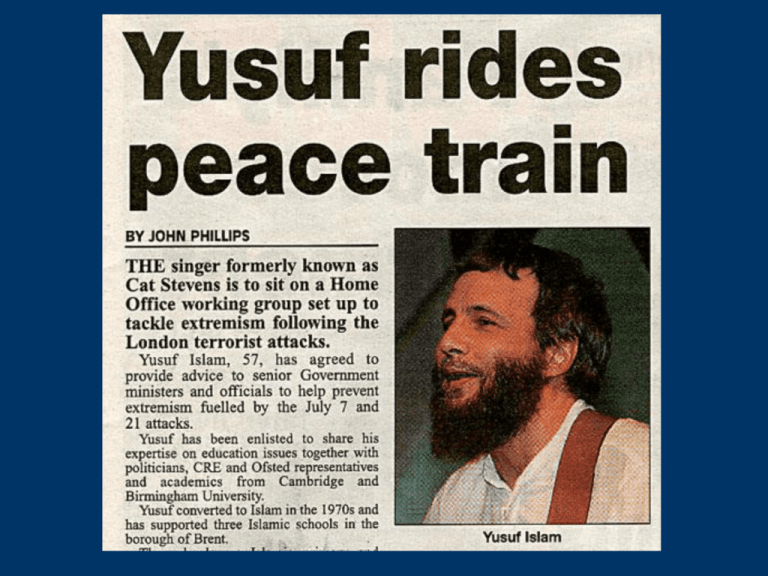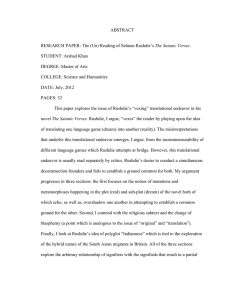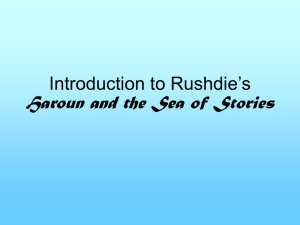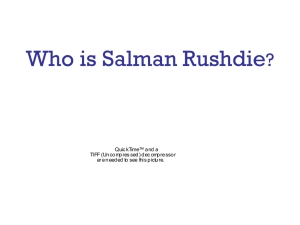Cat Stevens and Islamic Schools
advertisement

The facts, however, indicate that he was lying. On February 21, 1989 one week after the fatwa – he addressed a group of Muslim students at Kingston Polytechnic. He was asked about Rushdie's death sentence. The facts, however, indicate that he was lying. On February 21, 1989 - one week after the fatwa – he addressed a group of Muslim students at Kingston Polytechnic. He was asked Rushdie's death sentence. "He must be killed," he replied. "The Quran makes it clear. If someone defames the prophet he must die." Murdoch The Bishop of Manchester in the Church of England said the British blasphemy law is indefensible because it protects only the established Christian church. Other clerics have suggested that the law be extended to other faiths so Muslim objectors could stop offensive books through court order. In December 1977, Cat Stevens visited London's Central Mosque and converted to Islam. As Yusuf Islam, he was later accused of supporting the Ayatollah Khomeini's death sentence (fatwa) on Salman Rushdie for his authorship of The Satanic Verses. "One night I was lying back in bed," Cat Stevens once claimed, "and I saw this flying saucer shoot across the sky and stop over me. And it sucked me up into it. When it put me down, I shot up in bed. I knew it wasn't a dream. It didn't feel like a dream. It was real, I know it was real..." The Bishop of Manchester in the Church of England, the Rev. Stanley Booth-Clibborn, said the British blasphemy law is indefensible because it protects only the established Christian church. Other clerics have suggested that the law be extended to other faiths so Muslim objectors could stop offensive books through court order. Government Defenders Under Islamic Law, the ruling regarding blasphemy is quite clear; the person found guilty of it must be put to death. Only under certain circumstances can repentence be accepted…The fact is that as far as the application of Islamic Law and the implementation of full Islamic way of life in Britain is concerned, Today, Yusuf Islam is arguably one of the world's most famous converts to Islam. His pioneering work in the field of education resulted in securing a landmark decision by the British government to certify and support Islamic education throughout Great Britain. The three schools he founded in London’s Brent district – Islamia Primary, Islamia Girls' Secondary and the Brondesbury College for Boys – consistently top the borough’s examination league tables He also said that if Mr. Rushdie turned up at his doorstep looking for help, ''I might ring somebody who might do more damage to him than he would like.'' ''I'd try to phone the Ayatollah Khomeini and tell him exactly where this man is,'' said Mr. Islam, who watched a preview of the program today and said in an interview that he stood by his comments. Cat Stevens Gives Support To Call for Death of Rushdie By CRAIG R. WHITNEY LONDON, May 22 – The musician known as Cat Stevens said in a British television program to be broadcast next week that rather than go to a demonstration to burn an effigy of the author Salman Rushdie, ''I would have hoped that it'd be the real thing.'‘ A British bookseller, Tim Waterstone, chairman of the chain bearing his name, said that intimidation by opponents of the book ''at the end of the day probably will work.'' ''I don't want to see my staff in peril of their life and health,'' he said, ''and I don't want to see my customers in peril.'' Stevens later defended Sharia (Islamic law which prescribes the amputation of thieves's hands and the stoning of adulterers), supported the fatwa against Salman Rushdie ("He must be killed. The Qur'an makes it clear. If someone defames the prophet he must die..."), and (perhaps unwittingly) donated money to "charities" which funded terrorist activities. The singer, who adopted the name Yusuf Islam when he converted to Islam, made the remark during a panel discussion of British reactions to Ayatollah Ruhollah Khomeini's call for Mr. Rushdie to be killed for allegedly blaspheming Islam in his bestselling novel ''The Satanic Verses.'' He also said that if Mr. Rushdie turned up at his doorstep looking for help, ''I might ring somebody who might do more damage to him than he would like.'' ''I'd try to phone the Ayatollah Khomeini and tell him exactly where this man is,'' said Mr. Islam, who watched a preview of the program today and said in an interview that he stood by his comments. The statements by Mr. Islam and several other participants in the discussion demonstrate how divided British liberal intellectuals remain over the affair. British writers and publishers have signed petitions backing Mr. Rushdie's freedom to write what he wishes, but there have been no public readings of his works. 'Not a Pacifist Religion' Also on the show was Dr. Kalim Siddiqui, director of the Muslim Institute in London and one of the organizers of a nationwide demonstration against ''Satanic Verses'' that is scheduled for Hyde Park on Saturday. He said: ''I wouldn't kill him, but I'm sure that there are very many people in this country prepared at the moment. If they could lay their hands on Rushdie, he would be dead. ''As a British citizen, I have a duty, if you like, a social contract with the British state, not to break British law. We are not a pacifist religion. We don't turn the other cheek. We hit back.'' Murdoch Several of the participants defended Mr. Rushdie. The writer Fay Weldon, for example, said, ''Burn the book today, kill the writer tomorrow.'' She said she was offended by Mr. Islam's remarks, which she said incited people to violence. Muslims in Britain have been divided by the affair. They demonstrated against the book in several cities late last year, but they say British news organizations began paying attention to their objections only after the book was publicly burned. Dr. Siddiqui said book-burning was not on the program for Saturday's demonstration. He and other Muslims who participated in the 53-minute courtroom-style program, ''A Satanic Scenario,'' to be broadcast on Britain's Independent Television Network next Tuesday night, objected to cuts in the three-hour taping session, held April 15, that omitted the Muslim justification for punishment of blasphemy. Yusuf later backpedaled once again, defending his stand on the issue and calling the fatwa a deterrent (which he likened to America's possession of nuclear weapons). "My only crime," he remarked without a trace of irony, "was, I suppose, in being honest." [After flirting with every other major religion (as well as Tarot cards, the I Ching, and astrology), Stevens converted to Islam (and donated money to "charities" which funded terrorist activities). His conversion was prompted by a large wave which he claimed had saved him from drowning while swimming in the ocean. His song 'Longer Boats' is a song about flying saucers.] Stevens/Yusuf made his last stage appearance on November 22, 1979, later declaring, "I enjoyed the show, but my heart was with Allah." In order to abide by the Hadith (the sayings of the prophet Muhammed), which forbids images that may induce sentiments of human worship, he demanded that his label (Island Records) reissue his records with his pictures removed from the covers. Though Island reluctantly complied, many observers could not help but laugh at the absurdity of the demand. According to the Hadith, music itself (particularly instrumental music) is haram - expressly forbidden. (In the late 1990s, Radio Sharia - the Taliban's radio station - broadcast a song by Yusuf Islam called "Afghanistan." According to a Radio Sharia executive, the song was not haram because it was a cappella and religious in nature.)] [Trivia: In 2004, Islamic courts in Saudi Arabia banned the music played when a telephone call is placed on hold.]








